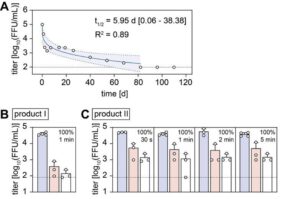In order to assess the risk of transmission of a given pathogen and determine the most appropriate hygiene measures, detailed information about its survival on different surfaces and susceptibility to disinfectants is required. The hepatitis E virus (HEV) is the most common cause of acute viral hepatitis, and mainly transmitted via fecal-oral contamination or consumption of contaminated food products. However, due to the lack of efficient cell culture systems for HEV, only limited data are available regarding HEV sensitivity to chemical disinfectants on inanimate surfaces.
A recent study by the team around Jan Wissmann and Prof. Eike Steinmann used a novel and robust HEV cell culture system to establish an HEV-based carrier assay to evaluate its surface stability and the virucidal activity of surface disinfectants. The team observed that HEV remained infectious on stainless steel up 80 days and alcohol-based disinfectants were insufficient to eliminate HEV infectivity. In contrast, disinfectants based on other active ingredients (aldehyde, peracetic acid, oxygen, and/or quaternary ammonium) efficiently inactivated HEV.

These findings provide valuable information to implement improved hygiene measures for the prevention of HEV transmission. Moreover, the test method developed here, will allow to examine the virus-inactivating activity of further chemical biocides in the future.
This study was published in Journal of Hospital Infection in February, 2023. Publication link: DOI: 10.1016/j.jhin.2023.01.013

